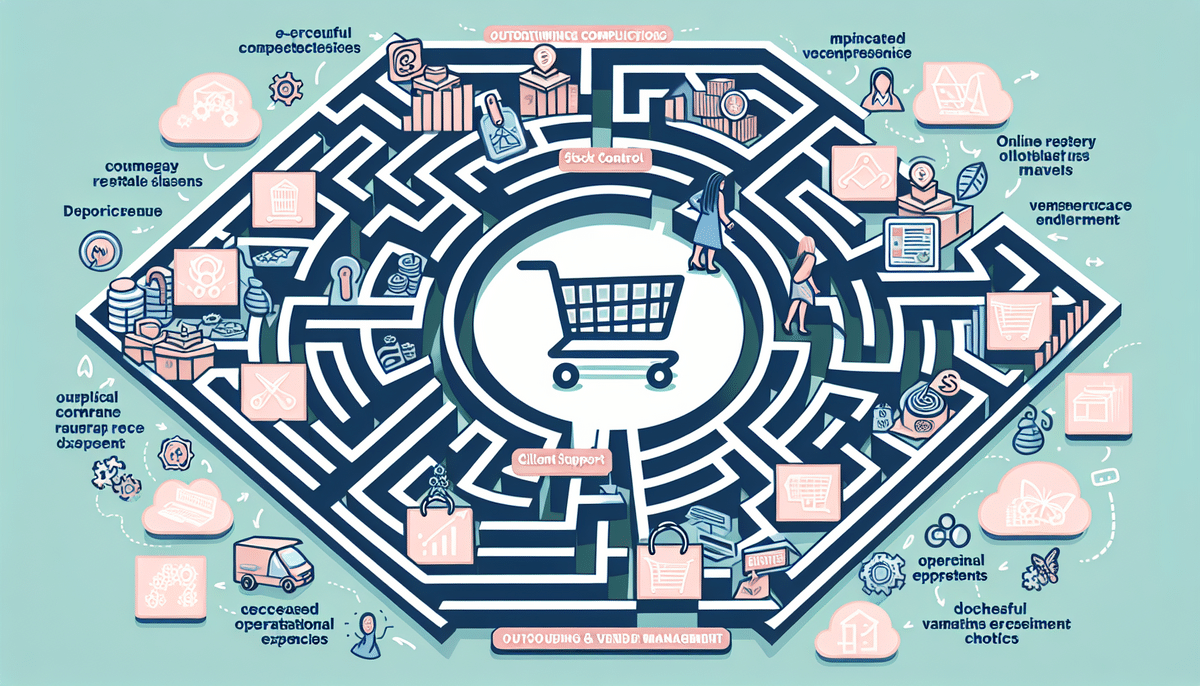Importance of Outsourcing and Vendor Management in E-Commerce
The e-commerce landscape is evolving rapidly, with global sales expected to surpass $7 trillion by 2025 according to Statista. As businesses scale, they encounter various operational challenges, including inventory management, order processing, and customer service. Outsourcing and effective vendor management are pivotal in addressing these challenges, enabling e-commerce businesses to streamline operations, enhance efficiency, and maintain competitive advantage.
Challenges in E-Commerce Operations
E-commerce businesses must navigate complexities such as managing vast inventories, ensuring timely order fulfillment, and delivering exceptional customer experiences. Additionally, staying ahead in a highly competitive market requires continuous innovation and adaptability.
Importance of Effective Vendor Management
Effective vendor management involves building and maintaining strong relationships with third-party service providers. It ensures that outsourced tasks are performed efficiently, quality standards are met, and operational risks are minimized. By leveraging vendor expertise, businesses can focus on their core competencies and drive growth.
Benefits of Outsourcing for E-Commerce Businesses
Outsourcing offers several advantages that can significantly benefit e-commerce operations:
- Cost Savings: Reduces operational costs by outsourcing non-core functions.
- Access to Specialized Expertise: Provides access to skills and technologies that may not be available in-house.
- Scalability: Allows businesses to scale operations up or down based on demand.
- Focus on Core Competencies: Enables businesses to concentrate on strategic activities that drive growth.
- Access to Latest Technology: Partners often have access to advanced tools and platforms, keeping businesses competitive.
These benefits collectively contribute to enhanced operational efficiency and business growth.
Selecting and Managing Vendors
Tips for Selecting the Right Vendors
Choosing the appropriate vendors is crucial for the success of outsourcing endeavors. Consider the following factors:
- Experience and Reputation: Assess the vendor’s track record and industry standing.
- Portfolio and References: Review past projects and seek client testimonials.
- Alignment with Business Objectives: Ensure the vendor understands and aligns with your business goals.
- Communication Skills: Effective and responsive communication is essential for smooth collaboration.
- Location and Time Zone: Consider geographic proximity to mitigate challenges like language barriers and time differences.
For instance, addressing potential shipping delays effectively is crucial for maintaining customer satisfaction and can be managed better with the right logistics partners.
Strategies for Managing Multiple Vendors
Managing multiple vendors simultaneously requires a structured approach to ensure consistency and reliability:
- Centralized Management: Use centralized systems to oversee all vendor activities.
- Consistent Communication: Maintain open and regular communication channels with all vendors.
- Performance Tracking: Implement key performance indicators (KPIs) to monitor and evaluate vendor performance.
- Clear Expectations: Define and communicate clear expectations and deliverables for each vendor.
- Strong Relationships: Foster strong relationships through regular feedback and engagement.
- Contingency Planning: Develop backup plans to address potential vendor failures or disruptions.
A proactive management strategy ensures a reliable supply chain and supports business objectives effectively.
Evaluating Vendor Performance
Regular evaluation of vendor performance is essential to maintain high service standards:
- Service Levels: Monitor the quality and timeliness of services provided.
- Billing Accuracy: Ensure invoices are accurate and reflect agreed terms.
- Contract Compliance: Verify that vendors adhere to contractual obligations.
- Adaptability: Assess the vendor’s ability to adapt to market trends and changing business needs.
- Technological Adoption: Evaluate the vendor’s use of the latest technologies and innovations.
Continuous performance assessments help in identifying areas for improvement and ensuring that vendors contribute positively to business goals.
Risks and Mitigation in Vendor Management
Dangers of Relying on a Single Vendor
Dependence on a single vendor can pose significant risks, including:
- Vendor Lock-In: Limits flexibility and can stifle innovation.
- Supply Chain Disruptions: Vulnerability to delays or quality issues from the sole vendor.
- Revenue Loss: Dependency on one provider may lead to potential revenue loss if issues arise.
To mitigate these risks, diversify your vendor base to ensure multiple sources of supply and service.
Preventing and Resolving Vendor Conflicts
Conflicts with vendors can disrupt operations and harm business relationships. To prevent and resolve conflicts:
- Open Communication: Maintain transparent and regular communication with vendors.
- Performance Monitoring: Track vendor performance to identify and address issues promptly.
- Clear Agreements: Define clear expectations, deliverables, and terms in written agreements.
- Dispute Resolution: Implement mediation or dispute resolution processes to handle conflicts efficiently.
Clear and comprehensive contracts help prevent misunderstandings and provide a framework for resolving disputes effectively.
Common Mistakes to Avoid in Outsourcing
Avoiding common outsourcing pitfalls is crucial for successful vendor relationships:
- Inadequate Research: Failing to thoroughly evaluate potential vendors can lead to subpar performance.
- Unclear Objectives: Lack of clear goals and expectations can result in misaligned outcomes.
- Poor Communication: Ineffective communication can hinder collaboration and project success.
- Inflexibility: Being unwilling to adapt to changes can limit the effectiveness of outsourcing partnerships.
- Lack of Monitoring: Neglecting to monitor vendor performance can allow issues to go unnoticed.
- Poor Risk Management: Failing to anticipate and plan for potential risks can disrupt operations.
- Ignoring Cultural Differences: Overlooking cultural nuances can affect collaboration and relationship building.
Implementing robust vendor management practices helps in avoiding these common mistakes and fosters successful outsourcing partnerships.
Cost and Quality Balance in Outsourcing
Balancing cost and quality is essential to ensure that outsourcing contributes positively to business profitability and standards:
- Selective Vendor Choice: Choose vendors that offer high-quality services within your budget constraints.
- Clear Communication: Establish clear communication channels to align business needs and expectations.
- Regular Updates: Maintain ongoing communication to prevent misunderstandings and keep projects on track.
- Contingency Planning: Develop plans to address unforeseen circumstances that may impact outsourcing projects.
By maintaining this balance, businesses can achieve operational efficiency without compromising on quality.
Negotiating Effective Vendor Contracts
Effective contract negotiation sets the foundation for successful vendor partnerships:
- Define Clear Terms: Specify timelines, deliverables, and payment terms clearly.
- Establish KPIs: Define key performance indicators to measure vendor performance.
- Legal Review: Have contracts reviewed by legal professionals to ensure compliance and protect interests.
- Data Security: Include data protection measures such as encryption and regular security audits.
- Communication Protocols: Set up clear channels for addressing issues and facilitating prompt resolutions.
Following these best practices ensures that contracts are comprehensive and facilitate a strong working relationship with vendors.
Outsourcing vs. Insourcing in E-Commerce
Deciding between outsourcing and insourcing is a critical decision that impacts operational efficiency and strategic focus:
- Outsourcing: Suitable for specialized capabilities not available within the organization. It offers flexibility and access to external expertise.
- Insourcing: Ideal when there are existing internal capabilities and it is cost-effective. It provides greater control over operations.
- Strategic Alignment: Align the decision with the overall strategic objectives of the business to ensure coherence and support growth.
- Risk and Benefit Analysis: Weigh the potential risks and benefits, such as access to expertise versus potential loss of control.
Carefully evaluating these factors helps in making informed decisions that support long-term business goals.
Future Trends in Outsourcing and Vendor Management
The future of outsourcing and vendor management in the e-commerce industry is shaped by emerging trends and evolving business needs:
- Digital Transformation: Increasing reliance on digital marketing, website development, and advanced analytics.
- Automation and AI: Leveraging automation and artificial intelligence to enhance efficiency and reduce costs.
- Sustainability: Growing focus on sustainable practices and partnering with vendors that prioritize environmental responsibility.
- Agile Vendor Management: Adopting agile methodologies to enhance flexibility and responsiveness in vendor partnerships.
- Globalization: Expanding into new markets requires vendors with international expertise and capabilities.
Staying abreast of these trends and adapting vendor management practices accordingly will enable e-commerce businesses to remain competitive and thrive in a dynamic market.
Conclusion
Outsourcing and vendor management are integral to the success of e-commerce businesses. By effectively managing vendors, businesses can achieve strategic objectives, reduce operational costs, and drive growth. Implementing robust vendor management practices, clearly defining objectives, and selecting the right vendors are imperative for sustaining business growth and maintaining a competitive edge in the ever-evolving e-commerce landscape.






















